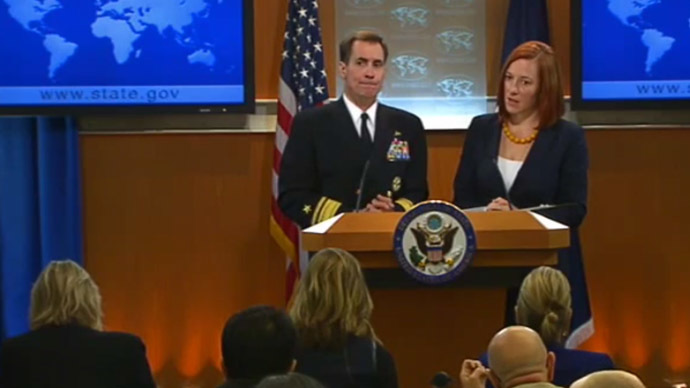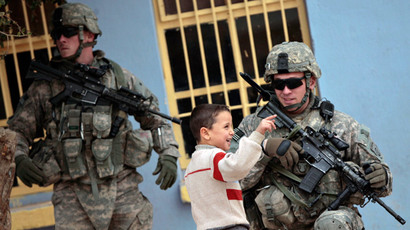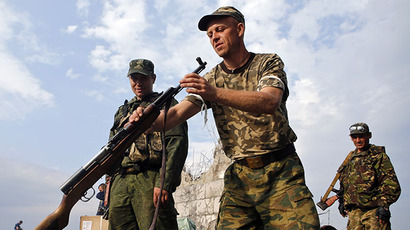Russia at the gates? US State Dept, Pentagon grilled over NATO expansion

US State Department spokesperson Jen Psaki and Pentagon Press Secretary Rear Adm. John Kirby have been challenged over the Department of Defense's claims that the US must “deal” with “modern and capable” Russian armed forces on NATO's doorstep.
Russian Defense Minister Sergey Shoigu expressed“grave concern” and
“surprise” at a Wednesday speech made by US Secretary of
Defense Chuck Hagel during the Association of the United States
Army’s annual conference. Hagel declared that US armed forces
"must deal with a revisionist Russia - with its modern and
capable army - on NATO's doorstep.”
Kirby was confronted by AP journalist Matt Lee over NATO
expansion closer to the Russian borders at the State Department's
daily press briefing on Thursday. Here is their exchange:
Matt Lee, AP journalist: What did he [Chuck
Hagel] mean by “revisionist Russia?”
John Kirby: Pentagon Press Secretary: I think
what he was referring to there is that there appears to be in
their intentions and their motives, a calling back to the “glory
days of the Soviet Union”.
L: He also used the phrase that its army – he
means Russian army is on NATO’s doorstep. Why is that? Is it not
logical to look at this and say – the reason why Russia’s army is
at NATO’s doorstep, is because NATO has expanded, rather than
Russian expanding? In other words, NATO has moved closer to
Russia rather than Russia moving closer to NATO.
K: I think that’s the way President [Vladimir]
Putin probably looks at it – it is certainly not the way we look
at it.
L: You don’t think that NATO has expanded
eastward towards Russia?
K: NATO has expanded…
L: So the reason that the Russian army is at
NATO’s doorstep is not the fault of the Russian army, not the
Russian army that’s done it, it’s NATO that moved closer east.
K: It wasn’t NATO that was ordering tons of tactical battalions
and army to the Ukraine border...
L: I am pretty sure that Ukraine is not a member
of NATO, unless that’s changed…?
K: NATO is not an anti-Russia alliance; it is a
security alliance….
L: For 50 years it was an anti-Soviet alliance.
How can you not even see how the Russians perceive it as a
threat, the fact that it keeps getting closer to their border.
K: I can tell that NATO is a defense alliance…
L: But it moved east. Correct?
K: It expanded but there is no reason to believe
that the expansion is a hostile and threatening move.
L: You are moving closer to Russia and you’re
blaming the Russians for being close to NATO.
K: We are blaming the Russians for violating the
integral territory of Ukraine and destabilizing the security
situation inside Europe.
L: Which is NOT in NATO…
Jen Psaki, spokesperson for the US Department of State:
Other countries feel threatened, let’s move on!
In terms of new threats at NATO’s borders, Russian Defense
Minister Sergey Shoigu said on Friday that it is the US which has
been “stubbornly approaching...closer to our doors.”
Relations between Russia and NATO have been tense since the
alliance accused Russia of becoming involved in the Ukrainian
conflict – a claim Russia has continuously and consistently
denied.
Following Crimea's accession to Russia in March, the US and
Europe bombarded Moscow with sanctions. NATO also significantly
increased its military presence near Russia's borders, especially
in Poland and the former Soviet Baltic states of Latvia,
Lithuania, and Estonia, which have expressed concern at the
potential for Russian incursions into their territories.














